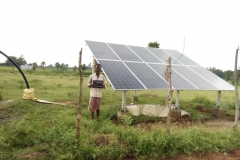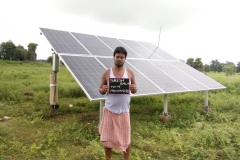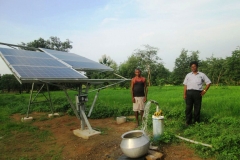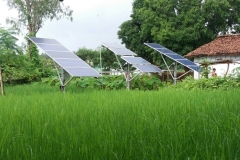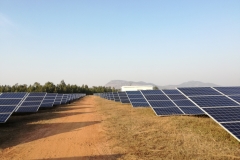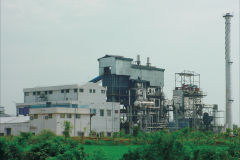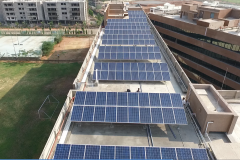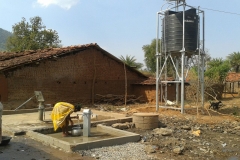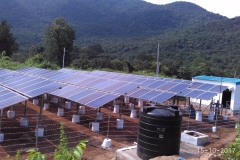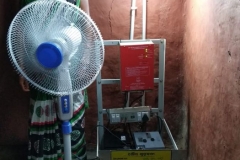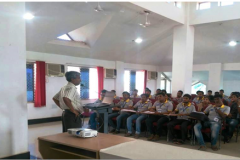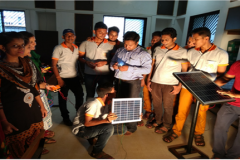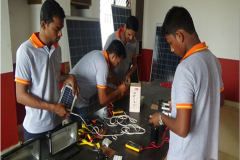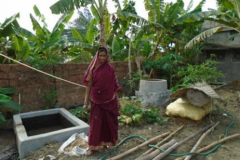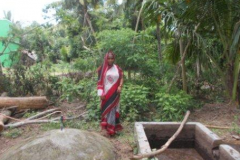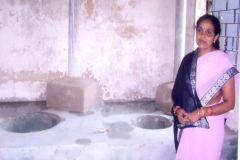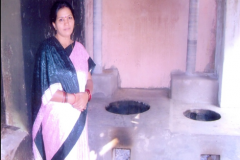RE Pro
1. KUSUM Scheme – Category A
Installation of grid-connected solar power plants each of capacity up to 2 MW in the rural areas which could be connected directly to existing 33/11 kV kV sub-stations of Distribution Company. Such plants near these sub-stations may be developed, preferably by farmers, giving them an opportunity to increase their income by utilizing their barren and uncultivable land for solar or other renewable energy based power plants.
2. KUSUM Scheme – Category B:
Installation of standalone off grid solar water pumps to fulfil irrigation needs of farmers not connected to the grid. To provide irrigation facility for round the year cropping two types of pumps i.e. 3 HP and 5 HP solar pumps have been provided to farmers. So far 1177 no. of solar pump installed and during FY 19. OREDA is undertaking installation of 2,500 solar pumps during FY 20.
3. On- Grid SPV power project:
SPV power plants of 48 MW cumulative capacity have been installed which are supplying power to the grid and including 5 MW under REC mechanism.
Odisha Solar Power Policy
4. On- Grid Biomass power project:
One Biomass Power plants of 20 MW capacities have been installed which is supplying power to the grid. Besides, 30.4 MW is installed under REC mechanism.
MNRE Revised Guide lines Scheme Biomass 11052018
5. Grid Connected Rooftop Solar Projects:
Grid connected rooftop solar power plants with net metering facility have been installed on the rooftop of many residential consumers, govt. building, institutions etc. So far 2.37 MW of capacity has been installed under this project.
Order on OERC Net Metering (August 2016 as amended upto 17.01.2018)
6. Off-grid Rooftop Solar Projects:
Under the program electricity is being provided to the house hold/Ashram school/office buildings/PHC/CHC/private institutions/ police stations for illumination and operation of other electrical appliances through Solar PV power plants with battery backup system. So far 842 no. of buildings have been covered with 4.78 MW off-grid solar power plants with battery back system.
7. Solar powered drinking water system:
The scheme envisages energising bore-wells/tube wells through solar pump in remote/un-served areas and ensures piped drinking water supply under the Jal Jeevan Scheme. Under the scheme 1 HP solar pumps are installed in existing bore wells and the water is lifted and stored in an over head tank of 5000 lt capacity from which water is supplied through stand posts installed in suitable locations. So far 10235 no. of solar drinking water projects have been installed.
8. Village Electrification & DDG under DDUGJY:
A Total of 92 villages were electrified in 2016-17 under TDCCOL. Under Decentralised Distributed Generation (DDG) scheme 14593 households in 394 villages electrified by solar energy in 2018-19. In 2019-20 under SAUBHAGYA (Pradhan Mantri Sahaj Bijli Har Ghar Yojana) it is targeted to electrify 14000 households in rural hamlet/ habitations.
Amendment to DDG Guidelines dated 01042013 July2013 Guidelines for Village Electrification DDG under RGGVY
9. Renewable Purchase Obligation/ Renewable Energy Certificate mechanism:
Distribution licensee (or any other entity procuring power on their behalf) or any person consuming electricity (a) generated from conventional Captive Generating Plant having capacity of 1 MW and above for his own use and or (b) procuring conventional generation through open access and third party sale are identified as Obligated Entities.
These Obligated entities are liable to purchase a certain quantity of their consumption from renewable sources a s detailed below.
Quantum of obligation as Proposed
| Year-wise target | Solar Source (%) | Non Solar sources (%) | Total (%) |
| 2015-16 | 0.50 | 2.50 | 3.00 |
| 2016-17 | 1.50 | 3.00 | 4.50 |
| 2017-18 | 3.00 | 4.50 | 7.50 |
| 2018-19 | 4.50 | 5.00 | 9.50 |
| 2019-20 | 5.50 | 5.50 | 11.00 |
- So far 62 obligated entities have been identified in the state which are mainly industries having Captive Generating units. Apart from these open access consumers also come under the RPO regime whose number changes every month.
- Of the above only 12 entities are fully or partially complying to their obligation while 8 have moved the Hon’ble High Court contesting imposition of RPOs and their cases are lying un-resolved.
- OREDA regularly monitors the compliance of RPOs by different entities and submits reports to OERC.
10. “Surya Mitra” Skill Development Program
- This MNRE, GoI sponsored program aims to develop skilled local human resource in solar energy sector to work as installers, service providers, entrepreneurs etc.
- Under this ITI and Diploma engineers are trained through select engineering colleges and training institutes for a period of 90 days as per the syllabus prescribed Sector Skill Council for Green Jobs.
- At the end of the course Sector Skill Council for Green Jobs conducts both practical and theory tests and awards Surya Mitra certificates to successful students.
- So far 540 students have been trained under the scheme.
11. National Biogas and Manure Management Program
- Under scheme family type biogas plants are being constructed in order to meet cooking & lighting need of the household. Besides, the plant supplied enriched manure. So far 2.44 lakhs plants have been constructed with the financial support in terms of subsidy of the MNRE.
- Reason for low progress is attributed to penetration of LPG , particularly through Ujala scheme , huge investment cost and shortage of cow dung .
12. Unnat Chullah Abhiyaan
- The program aims to provide cleaner cooking energy and to mitigate climate change.
- Under this program so far 10,409 Schools have been provided with improved cook-stoves for cooking mid-day meals and 6771 portable chullahs have been supplied to DFOs and Rage officers for distribution to households in forest /forest fringe villages.







